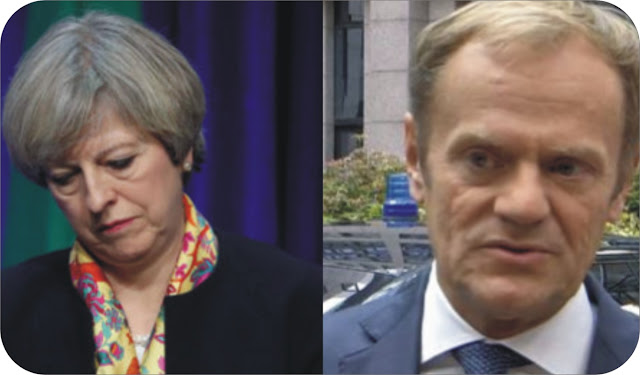Barely 24 hours after Britain triggered the much awaited
Article 50, have two powerful leaders in the European Union overruled one of
the major demands being made by the PM.
The retaliatory trigger was pulled by the German Chancellor
Angela Merkel and her French counterpart President Francois Hollande concerning
the manner in which Brexit the negotiation is being conducted.
Mrs Merkel, in her speech yesterday stated that: "The
negotiations must first clarify how we will disentangle our interlinked
relationship."
Similarly this morning Mr Hollande told the PM during a
phone conversation that he also thought the terms of withdrawal should come
first.
It is an obvious fact that the Mrs May is not ready to pay
up her exit fee, if she is not told the level of access that will be given to
her.
According to David Davis, while speaking to Sky News this
morning: "We've got to debate this" as he defended the Government's
view that talks over the UK's departure should run in parallel with future
trade negotiations."
He insists that Mrs Merkel doesn't have the final word,
saying: "It's a negotiation and we want to do it in a certain way."
But he adds: "Article 50 says the departure should be
negotiated taking into account the ongoing deal."
"It makes it pretty plain they've got to be done
together.
"We think that's a smart way to do it, because
everybody then can make a judgement as to what's a good outcome for everybody -
what the balance of outcomes are."
Though the Brexit Secretary’s claim is correct as it is
captured in Article 50
He is right that this is specified in Article 50 of the
Lisbon Treaty.
It states that if a country chooses to leave, "the
Union shall negotiate and conclude an agreement with that State, setting out
the arrangements for its withdrawal, taking account of the framework for its
future relationship with the Union". So therefore, it is left for the
parties involved to interpret it to suit their prevailing circumstances.
Guy Verhofstadt, leader of the European Parliament's
Alliance of Liberals and Democrats for Europe Group, told Adam Boulton's All
Out Politics on Sky News: "The treaty is very clear about this.
"In Article 50 it's stipulated that first of all you do
the withdrawal agreement in the light of your future relationship between the
UK and the EU."
From the look of things, Mrs Merkel's opinion appears to
have increasing backing, while this morning, when asked by Sky News, the PM's
spokesman was reluctant or unable to name any leaders who supported Mrs May on
this.
In some ways, Mrs Merkel's position on dismissing the idea
of parallel negotiations is strengthened by Mrs May's approach to Brexit.
Judging from her Lancaster House speech in January, the PM
was clear that the UK wanted a clean break from the EU, saying she did
"not seek to hold on to bits of membership as we leave".
Thus, it becomes quite simple for the EU to deliver that clean
break being sorted for by the UK, settling assets and liabilities, paying off
the divorce bill and then saying only afterwards we should look at the future
trading relationship.
Had the UK stated its willingness to retain certain areas of
EU membership, having a parallel negotiation would have more simple.
Nevertheless, the UK could still come up with the argument
that they still have some kind of shared interests in areas, like ongoing
investment in scientific research, and that these things need to be settled and
agreed upon before the divorce bill can be known.
When Sky News asked Number 10 whether the divorce bill was a
negotiating chip for a possible future trading deal with the EU, the PM's
spokesman said it would be inappropriate to comment on negotiation strategy.
It seems the negotiation over the negotiation could drag on
and certainly it is unlikely to be settled until after the Council of Europe
meets on 29 April.
Here ministers will decide the guidelines for negotiations.
Mr Davis says "that's the point at which we should
start saying 'OK, we agree here, we disagree there'".
But it's a worry that in the first battle of this
negotiation, the EU's biggest players are so openly opposed to the UK's planned
approach.












No comments:
Write comments